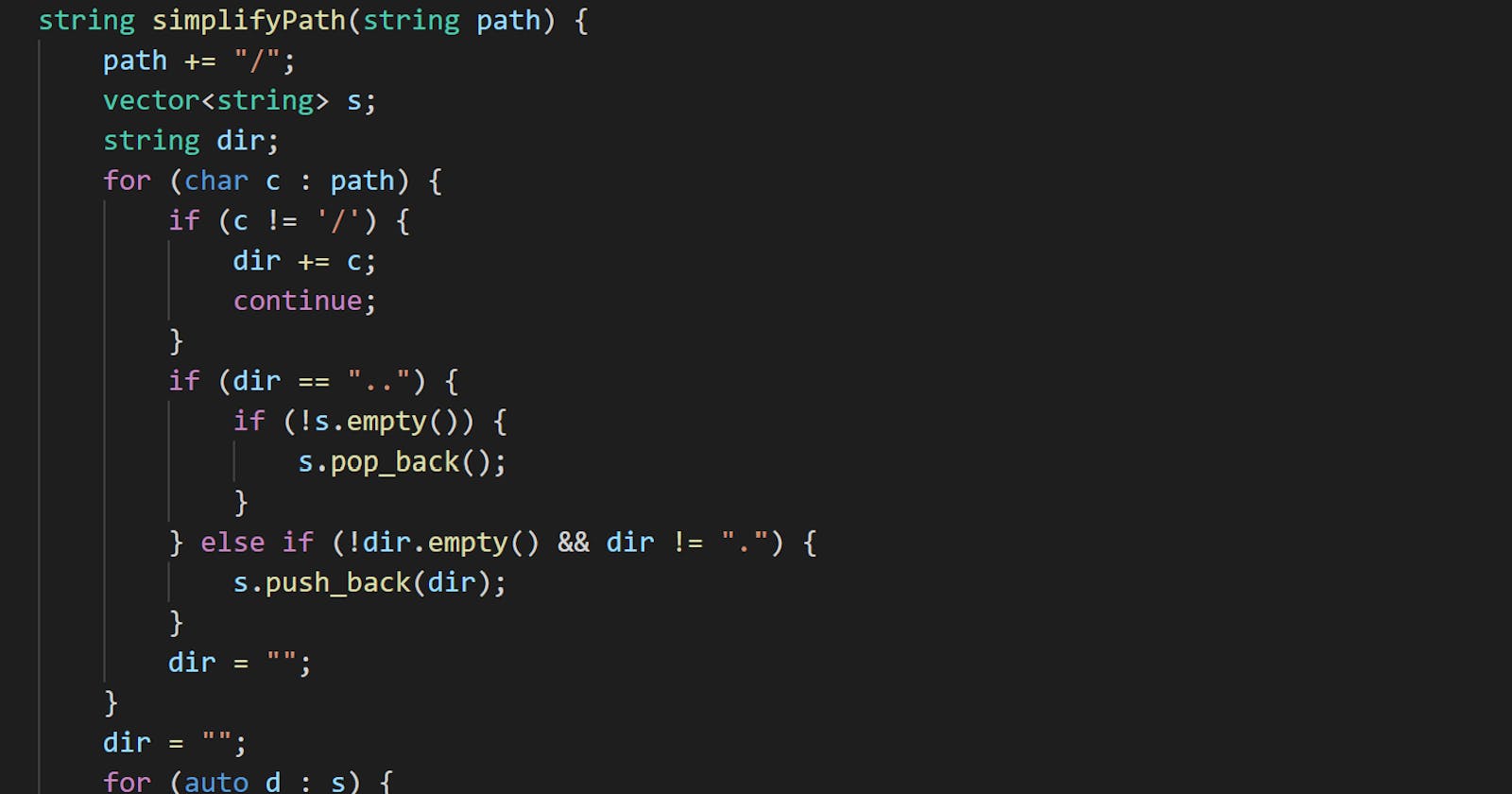Problem statement
Given a string path, which is an absolute path (starting with a slash '/') to a file or directory in a Unix-style file system, convert it to the simplified canonical path.
In a Unix-style file system, a period '.' refers to the current directory, a double period '..' refers to the directory up a level, and any multiple consecutive slashes (i.e. '//') are treated as a single slash '/'. For this problem, any other formats of periods such as '...' are treated as file/directory names.
The canonical path should have the following format:
- The path starts with a single slash
'/'. - Any two directories are separated by a single slash
'/'. - The path does not end with a trailing
'/'. - The path only contains the directories on the path from the root directory to the target file or directory (i.e., no period
'.'or double period'..').
Return the simplified canonical path.
Example 1
Input: path = "/home/"
Output: "/home"
Explanation: Note that there is no trailing slash after the last directory name.
Example 2
Input: path = "/../"
Output: "/"
Explanation: Going one level up from the root directory is a no-op, as the root level is the highest level you can go.
Example 3
Input: path = "/home//foo/"
Output: "/home/foo"
Explanation: In the canonical path, multiple consecutive slashes are replaced by a single one.
Constraints
1 <= path.length <= 3000.pathconsists of English letters, digits, period'.', slash'/'or'_'.pathis a valid absolute Unix path.
Solution: Using the property LIFO of a stack to handle directory ".."
Following the format constraints, you can store the directories' names in a stack. With its LIFO property, the last directory can be removed whenever the directory ".." appears next.
Code
#include <iostream>
#include <vector>
using namespace std;
string simplifyPath(string path) {
vector<string> s;
string dir;
for (char c : path) {
if (c != '/') {
dir += c;
continue;
}
if (dir == "..") {
if (!s.empty()) {
s.pop_back();
}
} else if (!dir.empty() && dir != ".") {
s.push_back(dir);
}
dir = "";
}
if (dir == "..") {
if (!s.empty()) {
s.pop_back();
}
} else if (!dir.empty() && dir != ".") {
s.push_back(dir);
}
dir = "";
for (auto d : s) {
dir += "/" + d;
}
return dir == "" ? "/" : dir;
}
int main() {
cout << simplifyPath("/home/") << endl;
cout << simplifyPath("/a/..") << endl;
cout << simplifyPath("/a//b////c/d//././/..") << endl;
cout << simplifyPath("/../") << endl;
cout << simplifyPath("/a/./b/../../c/") << endl;
}
Output:
/home
/
/a/b/c
/
/c
Complexity
- Runtime:
O(N), whereN = path.length. - Extra space:
O(N).
Implementation notes
As the property LIFO of a stack is used, you can use std::stack to implement the algorithm. But here are the reasons you can use std::vector for this purpose as well.
std::vectoralso supportspop_back()andpush_back()like astd::stack.- It is clearer to go from the root directory to the children ones with
std::vectorwhen building the canonical path from the simplified directories at the end of the algorithm.
On the other hand, in the solution above, a piece of code is duplicated to add the last directory to the stack.
One way to avoid it is by adding a slash '/' at the end of the path to force it ends with '/'. Then the duplicated code is handled inside the loop as well.
Code
#include <iostream>
#include <vector>
using namespace std;
string simplifyPath(string path) {
path += "/";
vector<string> s;
string dir;
for (char c : path) {
if (c != '/') {
dir += c;
continue;
}
if (dir == "..") {
if (!s.empty()) {
s.pop_back();
}
} else if (!dir.empty() && dir != ".") {
s.push_back(dir);
}
dir = "";
}
dir = "";
for (auto d : s) {
dir += "/" + d;
}
return dir == "" ? "/" : dir;
}
int main() {
cout << simplifyPath("/home/") << endl;
cout << simplifyPath("/a/..") << endl;
cout << simplifyPath("/a//b////c/d//././/..") << endl;
cout << simplifyPath("/../") << endl;
cout << simplifyPath("/a/./b/../../c/") << endl;
}
Output:
/home
/
/a/b/c
/
/c
Complexity
- Runtime:
O(N), whereN = path.length. - Extra space:
O(N).
